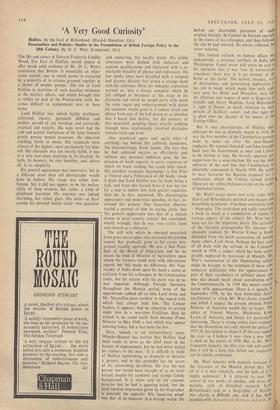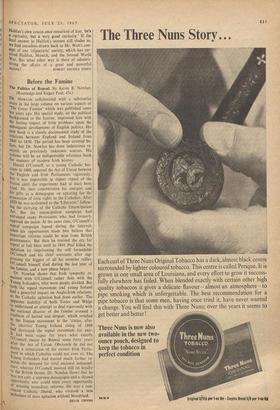`A Very Good Curiosity'
Halifax. By the Earl of Birkenhead. (Hamish Hamilton, 63s.)
THE life and career of Edward Frederick Lindley Wood, first Earl of Halifax, would appear to offer much solid evidence of Mr. D. C. Watt's contention that Britain 'is essentially an oligo- cratic society, one in which power is exercised by a minority of its citizens grouped together in a cluster of smaller groups.' The rise of Lord Halifax to positions of such dazzling eminence in the nation's affairs, and which brought him to within an inch of the Premiership itself, be- comes difficult to comprehend save in these terms.
Lord Halifax was indeed highly intelligent, cultivated, sincere, genuinely diffident and modest, devoid of any humbug, and essentially practical and realistic. His logic never had the cold and painful limitations of Sir John Simon's grimly precise mental processes. He abhorred anything facile or mean. His standards were always of the highest, most particularly for him- self. His character was not merely noble, it was in a very real sense inspiring in its idealism, its faith, its decency, its rare humility, and, above all, in its simplicity.
His general appearance was impressive, but in a different sense than old photographs would have us believe. His visage was rather woe- begone, but it did not appear to be the melan- choly of deep wisdom, but rather a kind' of perplexed boredom. His courtesy was indeed charming, but rather glum. His smile—at least outside his devoted family circle—was quizzical and endearing, but hardly warm. His public utterances were hedged with elaborate and copious qualifications and expressed with a re- markable banality of phrase and expression. His few public jokes were heralded with a resigned and gloomy distaste that struck a strange bond with his audience. Here, his unhappy expression warned us, was a dreary anecdote which he felt obliged to introduce at this stage in his discourse and which he would recite with much the same regret and embarrassment with which . his audience would greet it. I cannot recall one phrase from any of the half-dozen or so speeches that I heard him deliver, but the memory of that mournful, gangling figure wearily trudging through those interminably involved platitudes remains fresh and keen.
One wondered again and again what—if anything—lay behind this cultured, handsome, but disconcertingly blank façade. The fact that he had achieved success so effortlessly and without any personal ambition gave the im- pression of much sagacity in secret conclaves of which we knew nothing but could infer much. His excellent academic beginnings—a fine First at Oxford and a Fellowship of All Souls—made it plain that Lord Halifax was far from being a fool, and from this factual basis it was not too
far a step to endow him with greater capacities
than he, in fact, possessed. His discouraging appearance and pedestrian speeches, in fact, in- creased this process. One American observer started a portrait of him by saying, justly, that 'his general appearance was that of a church mouse or poor country cousin,' but concluded, wholly wrongly, that he was 'very crafty, keen and smooth as a silkworm.'
The skill with which he emerged unscathed from great catastrophes also increased the puzzled respect that gradually grew as his career pro- gressed steadily upwards. He was a bad Presi- dent of the Board of Education, and by no means the kind of Minister of Agriculture upon whom the farmers could look with affectionate regard, but this made no difference. His Vice- royalty of India drew upon his head a storm of criticism from his colleagues in the Conservative ranks, but his stature with his party was in no way impaired. Although Foreign Secretary throughout the Munich period, none of the opprobrium rubbed off 'on him. Lord Avon and Mr. Macmillan shave testified to the regard with which they always held him. The Labour leaders, it appears, had no objection to serving under him in a war-time Coalition. Had he wished it, he could easily have become Prime Minister in May 1940, a fact which may appear amazing today, but a fact none the less.
Here, indeed, is an extraordinary story. Wheeler-Bennett has written that Halifax 'had been ready to serve as the chief mate in the barque of appeasement, but he had never nailed his colours to the mast.' It is difficult to think of Halifax undertaking so dramatic or decisive a gesture, and in this probably lay the secret of his astonishing durability. He was the last person one would have thought of as an intel- lectual, despite his academic and strange family background. It is often said by his contem- poraries that he had 'a questing mind,' but the most marked impression given by his biographer is precisely the opposite. His 'inquiring mind' was that of an innocent in a strange world. He lacked any discernible processes of reallY original thought. In Cabinet he listened carefullY to the views of his colleagues, and then followed the one he had selected. He always reflected, but never radiated.
This limited outlook on human affairs was undoubtedly a priceless attribute in India and Washington. Gopal wrote well when he said of his character that it was 'free of meretricious ornament; there was in it no element of the florid or the facile.' His naIvite, decency, lack of deviousness, and painstaking application In the job in hand, which made him such sae easy prey for Hitler and Mussolini, won hint the affection and respect of men so disparate ds, Gandhi and Harry Hopkins. Lord Birkenhead is right to devote so much attention to these periods of Halifax's career, and also right not to gloss over the disaster of his tenure of the Foreign Office.
But it was characteristic of Halifax that although he was so dismally duped in 1938, he was the first member of the Chamberlain govern' ment to wake up after the post-Munich euphoria. He wanted Churchill and Eden brought back into the Government at once and Labour to be invited to join. He fiercely opposed any' , suggestions for a snap election. He was the chief advocate of the new line that Chamberlain so dejectedly announced in March 1939. He seems to have favoured the Russian proposal for a conference, which the Cabinet turned down. These are not trifling balances to put on the scales of historical justice.
Mr. Watt's essays move over a far wider field than Lord Birkenhead's polished and mature and beautifully produced—if perhaps excessively long —biography. The result does not really constitute a book so much as a compilation of studies of various aspects of the subject. Mr. Watt has 3 keen eye for the important detail. The activities of the German propagandist Dr. Gartner are shrewdly studied; Sir Warren Fisher is firmly defended from the harsh accusations of, among many others, Lord Avon. Perhaps the best essaY of all deals with the attitude of the Common' wealth in 1938, a subject which has been unfe givably neglected by historians of Munich. Mr' Watt's examination of this illuminating subject might be brought to the attention of those con' temporay politicians who use appeasement 85 part of their vocabulary of political abuse and who also mouth much about consultation with the Commonwealth. In 1938 this meant consul' tation with appeasement. There is a speech, in September 1938, by the then Australian Attov ney-General to which Mr. Watt draws attention and which I suspect the present eminent Prime Minister of Australia would like to forget. The antics of Vincent Massey, Mackenzie King. Lyons of Australia and Smuts are particularb interesting. There is strong prima fade evidenc° that the Dominions not only shared the policy ol 1937-38, but helped to shape it. If this was indeed the case—as I believe it was—then a new light is shed on the events of 1938. But, as Mr. Walt frequently laments, the fifty-year rule will enstw' that it will be a long time before our suspicion' can be wholly confirmed.
Mr. Watt remarks with majestic restraint di the literature of the Munich period that '1101 all of it is very scholarly, and the bulk of it i' highly polemical.' It is pleasant to note Ilic arrival of two works of another, and more ad; mirable, style of historical research. Lord Birkenhead's task as a biographer of Halifax was clearly a difficult one, and it has been handled with characteristic firmness and skill 1\' Halifax's own cousin once remarked of him, 'he's a curiosity, but a very good curiosity.' If the final answer to Halifax's success still eludes us, We find ourselves drawn back to Mr. Watt's con- cept of our 'oligocratic' society, which has sur- vived Halifax, Munich, and the Second World War. But what other way is there of adminis- tering the affairs of a great and powerful















































 Previous page
Previous page